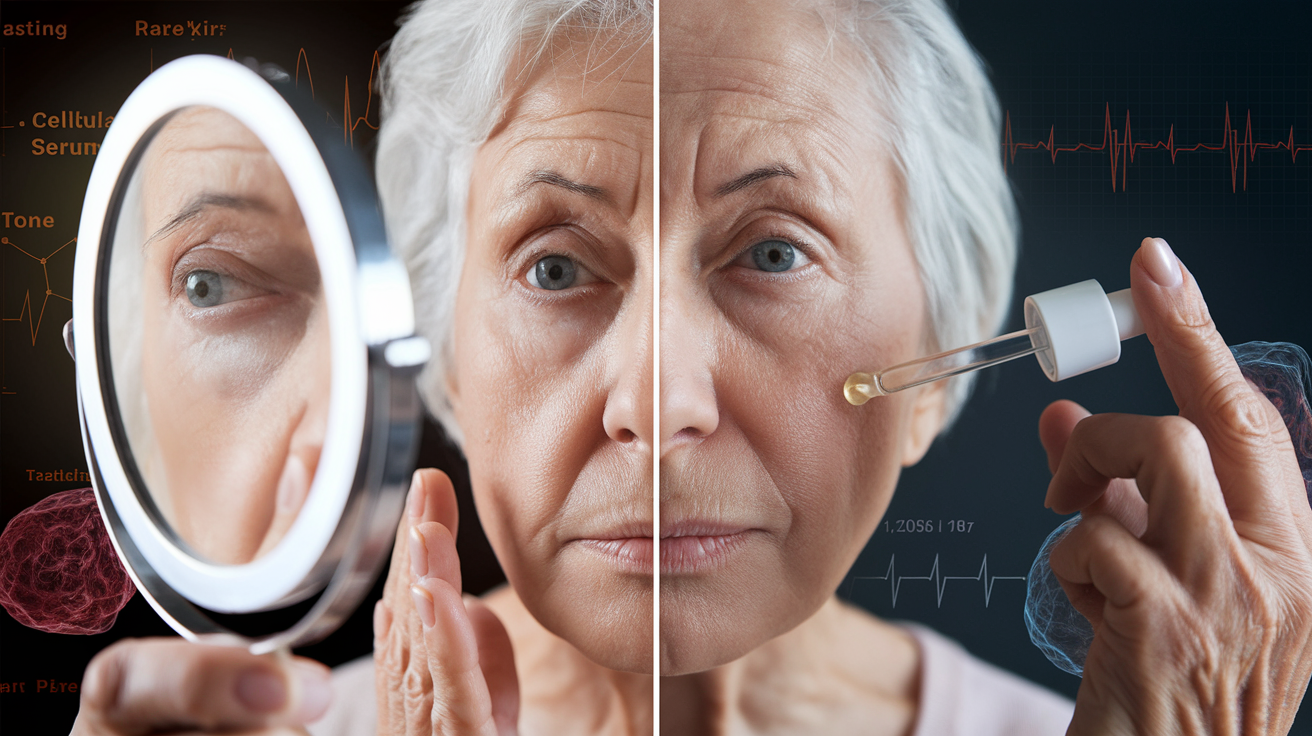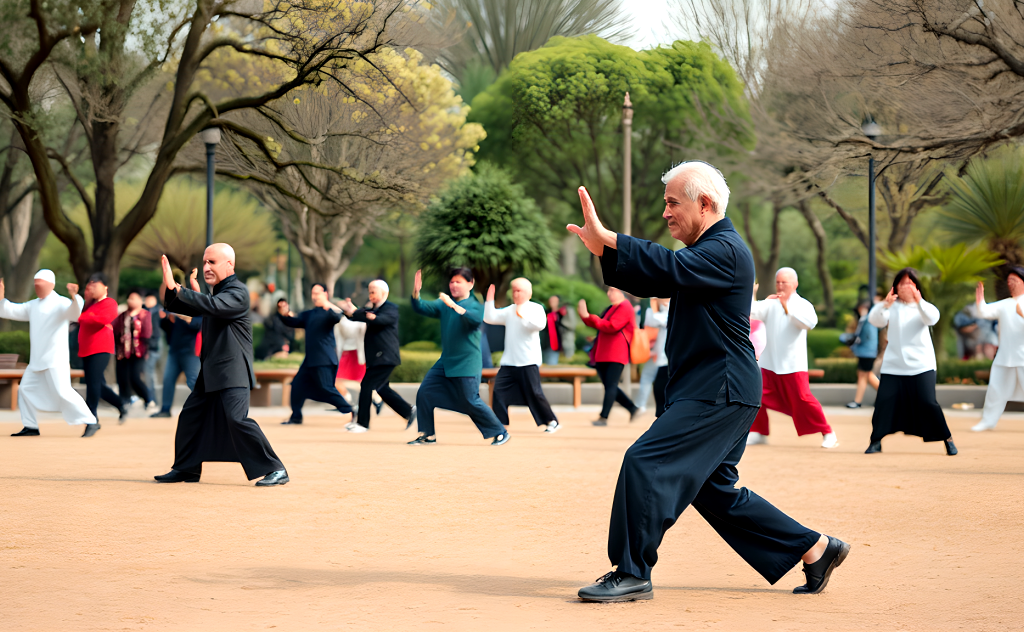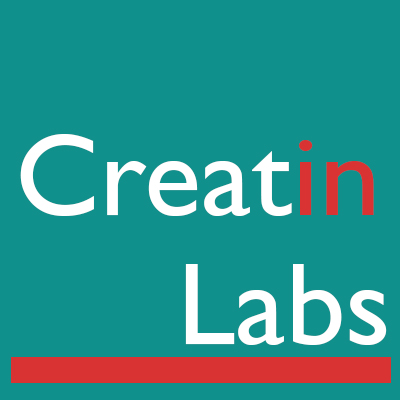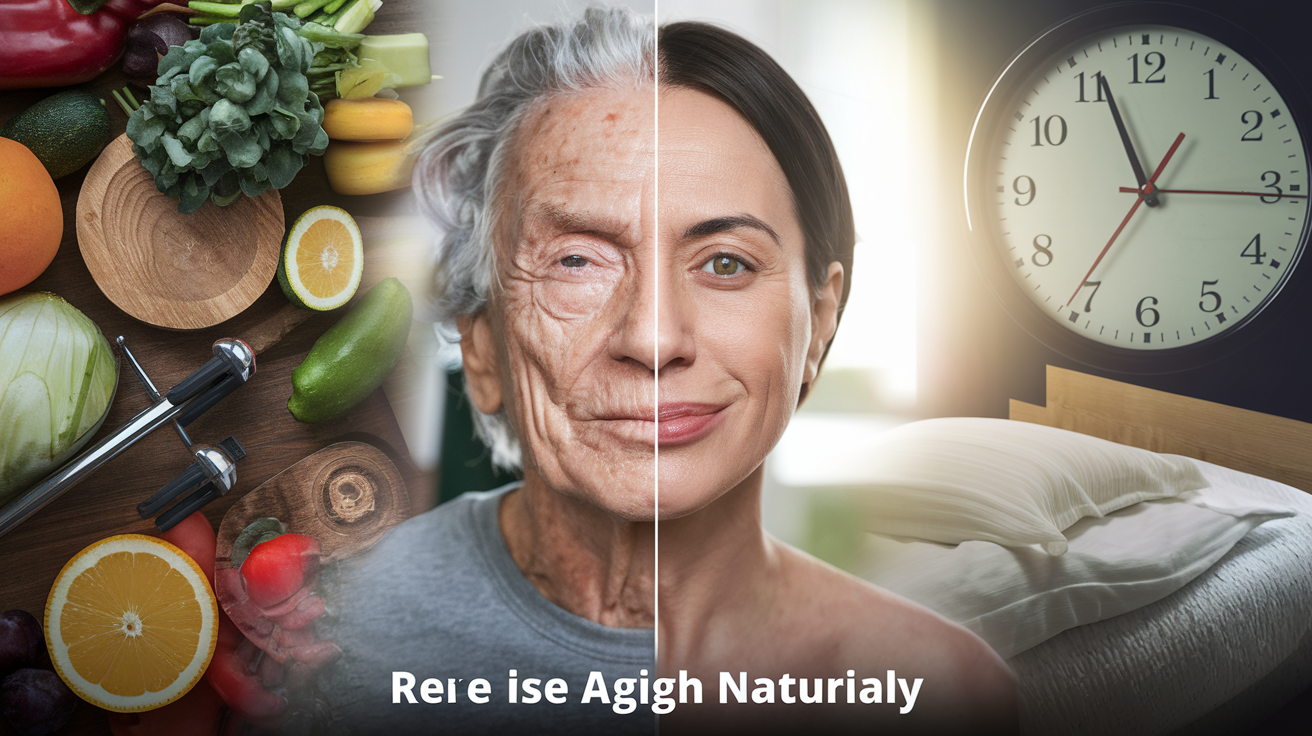10 Shocking Secrets to Reverse Aging Your Doctor Won’t Tell You
Have you ever wondered why some people seem to defy aging while others appear to age rapidly? The truth is, what your doctor may not be telling you is that aging isn’t just an inevitable downward spiral. Science has uncovered remarkable strategies that can actually reverse aspects of the aging process – yet these insights rarely make it into the standard 15-minute medical appointment. While pharmaceutical companies profit from treating symptoms of aging, simple but powerful lifestyle modifications could be transforming how you look and feel right now.
The shocking reality is that many age-related changes we accept as “normal” – from declining memory to decreased energy and physical weakness – can be significantly slowed or even reversed. 🔄 As we’ve discovered through cutting-edge research, your body has an incredible capacity for renewal when given the right tools. From little-known nutritional approaches that support cellular regeneration to physical practices that maintain muscle mass (crucial for mobility and independence), the secrets to youthful vitality might be simpler than you think. In this eye-opening guide, we’ll explore how to maintain physical health, preserve cognitive function, nurture emotional wellbeing, and protect sensory health—empowering you with knowledge that could add vibrant, healthy years to your life.
Understanding Physical Changes in Aging

A. Cardiovascular System Changes and Heart Health Strategies
Did you know your heart has already beat over 2 billion times by age 50? That’s incredible endurance, but even this amazing muscle faces changes with age.
Your blood vessels naturally stiffen over time, making your heart work harder with each beat. This is why blood pressure often climbs as we get older. But here’s what doctors don’t advertise enough: these changes aren’t set in stone.
Regular cardio exercise – even starting in your 60s or 70s – can reverse many age-related heart changes. Just 30 minutes of moderate activity five days a week can lower your heart age by up to 10 years!
Nitric oxide is your secret weapon here. This compound helps blood vessels stay flexible, and you can boost it naturally. Beets, spinach, and arugula are powerhouse foods that increase nitric oxide production. A daily handful of mixed nuts provides the perfect balance of heart-healthy fats.
Sleep quality trumps quantity for heart rejuvenation. Your heart repairs itself primarily during deep sleep stages. Try this trick: cool your bedroom to 65-68°F to boost deep sleep by up to 35%.
B. Bone Density and Muscle Loss Prevention
Your skeleton completely regenerates every 10 years – yes, really! But after 40, bone regeneration slows dramatically while breakdown continues, creating that perfect storm for thinning bones.
The medical establishment pushes calcium supplements, but they’re missing half the picture. Vitamin K2 is the unsung hero that actually directs calcium into your bones instead of your arteries. Just one serving of natto (fermented soybeans) provides more K2 than ten supplements combined.
Muscle loss accelerates at about 3% yearly after 50, but strategic resistance training reverses this completely. The magic happens when you reach “momentary failure” – that point where you absolutely cannot do another rep. You only need to hit this twice weekly to maintain youthful muscle mass.
Most overlooked bone-building hack? Weight-bearing impact. Ten jumps daily (yes, just ten!) increases hip bone density more effectively than walking a mile, according to research that rarely makes headlines.
C. Gastrointestinal Health Maintenance
Your digestive system runs a marathon every day, processing roughly 2 tons of food and 1,500 gallons of digestive juices yearly. No wonder it shows wear and tear as we age!
Stomach acid production naturally declines about 1% per year after 40, leading to poor nutrient absorption and that bloated feeling after meals. But contrary to what TV commercials suggest, many people actually need MORE stomach acid, not less.
Try this simple test: mix 1/4 teaspoon baking soda in water and drink it first thing morning. If you don’t burp within 5 minutes, you likely have low stomach acid – something most doctors never check.
Your microbiome diversity typically shrinks with age, but fermented foods can reverse this trend dramatically. One study found just 2 tablespoons of sauerkraut daily introduced more beneficial bacteria than expensive probiotic supplements.
Digestive enzymes decline with age too, but pineapple, papaya, and ginger naturally boost enzymatic activity. Raw foods contain their own enzymes – aim for 30% of your diet from uncooked sources to maintain youthful digestion.
D. Managing Urinary System Changes
Nobody talks about it at dinner parties, but urinary changes affect virtually everyone as they age. Your kidneys filter about 50 gallons of blood daily at age 30, but by 70, that efficiency drops by nearly 40%.
The bladder typically loses about 50% of its capacity between ages 30 and 70. But pelvic floor exercises can reverse this decline in just 6 weeks. The trick most doctors don’t emphasize: proper technique matters more than repetitions. Try holding each contraction for a full 10 seconds while completely relaxed elsewhere in your body.
Nighttime bathroom trips interrupt deep sleep cycles crucial for cellular repair. Try this counterintuitive approach: drink more water early in the day, then taper off after 4pm. Concentrated urine actually irritates the bladder more, triggering those midnight wakings.
Certain medications silently damage kidney function over time. The biggest culprits? NSAIDs like ibuprofen. Natural alternatives like turmeric offer similar anti-inflammatory benefits without the kidney burden. Just add black pepper to boost absorption by a staggering 2,000%.
Essential Physical Health Practices for Healthy Aging

Benefits of Regular Exercise for Longevity and Mobility
You’ve probably heard that exercise is important, but did you know it’s basically your body’s secret reset button?
Regular physical activity doesn’t just help you fit into those jeans from five years ago. It’s rewiring your entire cellular aging process. Studies show that people who exercise regularly have longer telomeres—those protective caps on your chromosomes that naturally shorten as you age.
What’s shocking is how little it takes to see benefits. Just 30 minutes of moderate activity five days a week can:
- Boost cardiovascular health by 30%
- Increase bone density (especially important after 40)
- Improve insulin sensitivity by up to 25%
- Enhance mitochondrial function (your cellular energy factories)
- Reduce inflammation markers throughout your body
The magic happens when you mix it up. A combination of:
- Strength training (twice weekly)
- Cardiovascular exercise (3-5 times weekly)
- Flexibility work (daily)
- Balance training (3 times weekly)
This comprehensive approach keeps your body guessing and adapting. The real anti-aging secret? Consistency trumps intensity. A daily walk beats a monthly marathon for longevity benefits.
Your mobility is your freedom pass to enjoy life as you age. Those who maintain flexible joints and strong muscles in their 50s and 60s are setting themselves up for independent living well into their 80s and beyond. That’s not just living longer—it’s living better.
Optimal Nutrition Approaches: Mediterranean and MIND Diets
Want to know why certain coastal Italians and Greeks are still climbing mountains well into their 90s? Their diet is practically an anti-aging serum.
The Mediterranean diet isn’t a fad—it’s survived thousands of years because it works. The evidence is overwhelming: people who stick with this eating pattern show fewer signs of aging at the cellular level.
Here’s what makes these diets powerful age-fighters:
| Mediterranean Diet Components | MIND Diet Additions |
|---|---|
| Olive oil (primary fat source) | Leafy greens 6+ times weekly |
| Fish 2-3 times weekly | Berries (especially blueberries) 2+ times weekly |
| Limited red meat | Nuts daily |
| Abundant fresh vegetables | Beans every other day |
| Moderate wine consumption | Limited butter, cheese, fried food |
| Whole grains daily | Poultry and fish over red meat |
The MIND diet (Mediterranean-DASH Intervention for Neurodegenerative Delay) takes things further by specifically targeting brain health. Research shows it can slow cognitive decline by up to 7.5 years.
The secret isn’t what these diets include—it’s what they crowd out. By filling your plate with anti-inflammatory, antioxidant-rich foods, you naturally consume fewer pro-aging foods like processed carbs, sugar, and industrial seed oils.
Your body is literally building new cells from what you eat. Feed it premium materials, and it builds a premium you.
Importance of Quality Sleep and Sleep Hygiene
That whole “I’ll sleep when I’m dead” mentality? It actually gets you there faster.
Sleep is when your body conducts its most critical repair work. During deep sleep phases, your brain flushes out damaging proteins (like beta-amyloid), your skin produces collagen, and your body releases growth hormone—nature’s own anti-aging compound.
Most people don’t realize sleep quality matters more than quantity. Six hours of uninterrupted deep sleep beats eight hours of fragmented, shallow sleep any day.
Your sleep hygiene checklist for age-reversal:
- Consistent schedule (yes, even weekends)
- Complete darkness (blackout curtains or sleep mask)
- Cool temperature (65-68°F/18-20°C)
- No screens 90 minutes before bed (blue light blocks melatonin)
- Limit alcohol and caffeine after 2pm
- Create a bedtime ritual your body recognizes
Here’s the shocking part: just one week of poor sleep ages your skin, reduces immune function, and creates metabolic changes mimicking pre-diabetes. Yet doctors rarely ask about sleep quality during check-ups.
The good news? Sleep improvements show benefits almost immediately. People report clearer thinking, reduced inflammation, and better skin tone after just three consecutive nights of quality sleep.
Regular Medical Check-ups and Preventive Care
The days of “if it ain’t broke, don’t fix it” are over. Modern preventive medicine can spot problems years before symptoms appear.
Smart aging requires strategic partnerships with healthcare providers. The right screenings at the right times can identify issues when they’re still reversible.
After 40, these baseline tests become your anti-aging allies:
- Comprehensive blood panel (annually)
- Inflammatory markers like C-reactive protein (annually)
- Hormone levels (annually)
- Bone density scan (every 2-5 years after 50)
- Colonoscopy (starting at 45, then every 10 years)
- Skin cancer screening (annually)
But here’s what your doctor might not emphasize: advocate for more advanced testing like:
- Coronary calcium scan (identifies heart disease risk before symptoms)
- Advanced lipid panel (goes beyond basic cholesterol)
- Vitamin D, B12, and magnesium levels
- Telomere length testing
- Micronutrient analysis
The most overlooked aspect of medical care? Dental health. Gum disease increases inflammatory markers throughout your body and accelerates aging processes. Yet most people don’t connect their twice-yearly dental cleanings to their longevity strategy.
Prevention isn’t just about avoiding disease—it’s about optimizing your biological systems for maximum performance and longevity.
Maintaining Cognitive Function
Brain-Healthy Lifestyle Choices
You want to keep your brain sharp as you age? The truth is, your daily habits matter more than any miracle pill your doctor might prescribe.
Sleep is your brain’s best friend. When you skimp on those 7-9 hours of quality shut-eye, you’re basically telling your brain to age faster. Those “I’ll sleep when I’m dead” folks? They’re speeding up the process.
Your diet choices are rewiring your neural pathways every single day. The Mediterranean diet isn’t just a trend – it’s backed by serious research showing it can preserve brain volume that normally shrinks with age. Swap those processed foods for fatty fish, olive oil, nuts, and colorful veggies.
Physical activity isn’t negotiable. Your brain needs good blood flow, and sitting all day is slowly suffocating it. Even a 30-minute daily walk boosts cognitive function. No gym membership required.
Social connections literally build brain resilience. That friend who’s always dragging you out for coffee? They’re helping your brain more than any crossword puzzle.
Effective Cognitive Training Activities
Brain games aren’t all created equal. Those fancy apps promising to boost your IQ? Most are just making your wallet lighter.
What actually works:
- Complex problem solving: Think chess, strategic card games, or learning to code
- Dual-tasking exercises: Like having a conversation while walking on uneven terrain
- Mindfulness meditation: Just 10 minutes daily reshapes brain structure
The key is progressive challenge. Your brain needs to struggle a bit – that comfortable, easy routine is cognitive kryptonite.
Learning New Skills to Enhance Memory
Your brain craves novelty. Each time you learn something completely new, you’re creating fresh neural pathways.
Dancing lessons outperform crossword puzzles for brain health because they combine physical movement, social interaction, memory work, and coordination. Your brain gets a complete workout.
Digital detoxes aren’t just wellness hype – they’re memory enhancers. Constant notifications fragment your attention and prevent deep learning that builds lasting memory.
Try this approach: dedicate 45 minutes to learning something completely unfamiliar three times weekly. Could be watercolor painting, a language, an instrument – whatever feels intimidating is probably perfect.
Managing Risk Factors for Cognitive Decline
The shocking truth? Up to 40% of dementia cases might be preventable through lifestyle modifications.
Stress is literally toxic to your brain. That constant cortisol bath is shrinking your hippocampus – the memory center. Stress management isn’t a luxury; it’s essential brain maintenance.
Hearing loss is a massive risk factor for cognitive decline that most doctors don’t emphasize enough. If you’re constantly asking people to repeat themselves, get tested.
Blood pressure management matters more than you think. Hypertension damages the delicate blood vessels feeding your brain. Monitor yours regularly, not just at annual check-ups.
Depression and social isolation are silent brain killers. They increase inflammation throughout your body, including your brain tissue. Seeking help isn’t weakness – it’s smart cognitive protection.
Nurturing Mental and Emotional Wellbeing
A. Combating Social Isolation and Loneliness
You know what doctors don’t talk about when it comes to aging? How deadly loneliness can be. Yeah, that’s right – social isolation ages you faster than smoking a pack a day. Yet nobody’s writing prescriptions for “call a friend.”
Want the truth? Your social connections are anti-aging gold. Research shows people with strong social ties live up to 50% longer than those flying solo. That’s not a typo.
Try these connection boosters that reverse aging at the cellular level:
- Join a weekly class or group – anything from book clubs to pickle ball
- Schedule regular video calls with far-away family
- Volunteer somewhere (hospitals and animal shelters always need help)
- Use technology to your advantage with apps designed for 50+ connections
Don’t wait for others to reach out. Be the one who initiates. That simple act strengthens your emotional resilience and literally rewires your brain toward youth.
B. Effective Stress Management Techniques
Chronic stress is like pouring aging accelerant on your cells. It literally shortens your telomeres – those protective caps on your DNA that determine how quickly you age.
The medical community’s big secret? Stress management isn’t optional for age reversal – it’s absolutely essential.
Try these science-backed techniques your doctor should be recommending:
- Breathwork – Just 10 minutes of deep, rhythmic breathing triggers your parasympathetic nervous system, essentially hitting your body’s “youth button”
- Nature immersion – A 20-minute forest walk lowers cortisol levels more effectively than most medications
- Digital detox – Cutting screen time by 30% improves sleep quality, which directly impacts cellular regeneration
- Cold exposure – Brief cold showers or ice baths boost mitochondrial function and reduce inflammation – both critical for reversing aging
Most doctors focus only on treating stress symptoms rather than teaching these proven techniques that address root causes.
C. Recognizing and Addressing Depression
Depression accelerates aging by 10-15 years at the cellular level. Let that sink in.
The medical establishment often treats depression as just a mental health issue, but it’s actually a whole-body condition that dramatically speeds aging. Your doctor probably hasn’t mentioned that depression triggers chronic inflammation, oxidative stress, and telomere shortening – all major aging factors.
Warning signs your emotional health is aging you:
- Persistent sleep changes
- Loss of interest in activities
- Unexplained physical symptoms
- Cognitive fog or memory issues
- Social withdrawal
Don’t just accept these as “normal aging.” They’re not. And don’t just reach for antidepressants as your only option. Consider these evidence-based approaches:
- Cognitive Behavioral Therapy (CBT) – rewires negative thought patterns
- Mindfulness-Based Cognitive Therapy – particularly effective for preventing relapse
- Anti-inflammatory nutrition – addresses the biological roots of depression
- Movement therapies – especially those combining social connection
D. Engaging in Fulfilling Leisure Activities and Hobbies
The billion-dollar anti-aging industry doesn’t want you to know this simple truth: finding purpose through hobbies reverses biological aging more effectively than most creams and supplements.
When you engage in activities that challenge your brain while bringing joy, you trigger a cascade of youth-promoting neurochemicals that literally turn back your body’s clock.
The most powerful anti-aging hobbies combine:
- Learning new skills
- Social connection
- Physical movement
- Creative expression
Studies of centenarians worldwide reveal they share one common trait: continued engagement in meaningful activities they enjoy. It’s not complicated, but it is profound.
Start with just 30 minutes three times weekly devoted to something that absorbs your attention completely. This flow state activates youth-promoting genes and suppresses inflammatory markers associated with aging.
Your hobby doesn’t need to be impressive or Instagram-worthy. The only requirement? It must genuinely interest YOU and provide a sense of accomplishment or connection.
Sensory Health in Older Adults
Preserving Vision Through Protective Measures
Aging eyes need more love than we typically give them. By your 40s, you’ll notice those restaurant menus getting harder to read. But that’s just the beginning.
Want the truth? Your eyes are taking a beating from blue light every single day. Your phone, laptop, TV – they’re all bombarding your retinas with harmful rays that speed up macular degeneration. But here’s what your ophthalmologist probably skips telling you: specialized blue light glasses can reduce this damage by up to 40%.
Sun exposure is another silent vision killer. UV damage accumulates over decades, not overnight. Quality sunglasses aren’t just a fashion statement – they’re your eyes’ best defense against cataracts forming years earlier than they should.
And that antioxidant-rich diet everyone keeps pushing? It actually works. Lutein and zeaxanthin found in dark leafy greens literally concentrate in your retinas, forming a protective barrier against age-related breakdown.
Maintaining Hearing Health
The hearing aid industry doesn’t want you knowing this, but most hearing loss isn’t inevitable – it’s preventable.
Those earbuds pumping music directly into your ear canals? They’re aging your hearing by about 12 years. The 60/60 rule is your new best friend: no more than 60% volume for no more than 60 minutes at a time.
Here’s the real kicker – hearing loss doesn’t just affect your ears. Studies show it dramatically accelerates cognitive decline and can increase dementia risk by up to 200%. Yet most people wait 7+ years after noticing hearing problems before seeking help.
Certain medications are secretly damaging your hearing too. Over 200 known ototoxic drugs slowly chip away at the delicate hair cells in your inner ear – including some common antibiotics and pain relievers your doctor might prescribe without warning.
Regular Sensory Check-ups and Interventions
The annual eye exam isn’t just about updating your glasses prescription. Those dilated exams can catch everything from diabetes to brain tumors years before other symptoms appear.
Most people don’t realize hearing tests should be as routine as dental check-ups after 50. Yet Medicare and most insurance plans won’t cover them unless you’re already showing significant loss – talk about backward thinking!
Early intervention is your golden ticket. Caught early enough, many sensory declines can be halted or even reversed with targeted therapies. But wait too long, and you’re looking at permanent damage.
The most cutting-edge anti-aging clinics now offer comprehensive sensory preservation programs combining specialized supplements, low-level light therapy, and custom exercises that can rewind your sensory age by 5-10 years. You won’t hear about these from conventional doctors still pushing the “aging is inevitable” narrative.
Your senses are your window to the world – and they can stay crystal clear decades longer than most people think possible.
The journey to reverse aging isn’t about finding a magical fountain of youth, but rather embracing scientifically-backed lifestyle changes that your doctor might not emphasize enough. As we’ve explored throughout this article, aging well involves a holistic approach—from maintaining physical health through regular exercise and proper nutrition to nurturing cognitive function and emotional wellbeing. The “shocking secrets” aren’t really secrets at all, but rather powerful, evidence-based strategies that often get overlooked in our quick-fix culture.
Remember, it’s never too late to start making positive changes. Whether it’s adopting a Mediterranean diet rich in fruits and vegetables, engaging in regular physical activity, prioritizing quality sleep, or simply spending more time with loved ones to combat loneliness, these actions can significantly impact how you age. By taking control of your health today through these strategies, you’re not just adding years to your life—you’re adding life to your years. Start implementing these practices now, and you might be surprised at how quickly your body and mind respond to these natural, doctor-approved approaches to aging gracefully.

